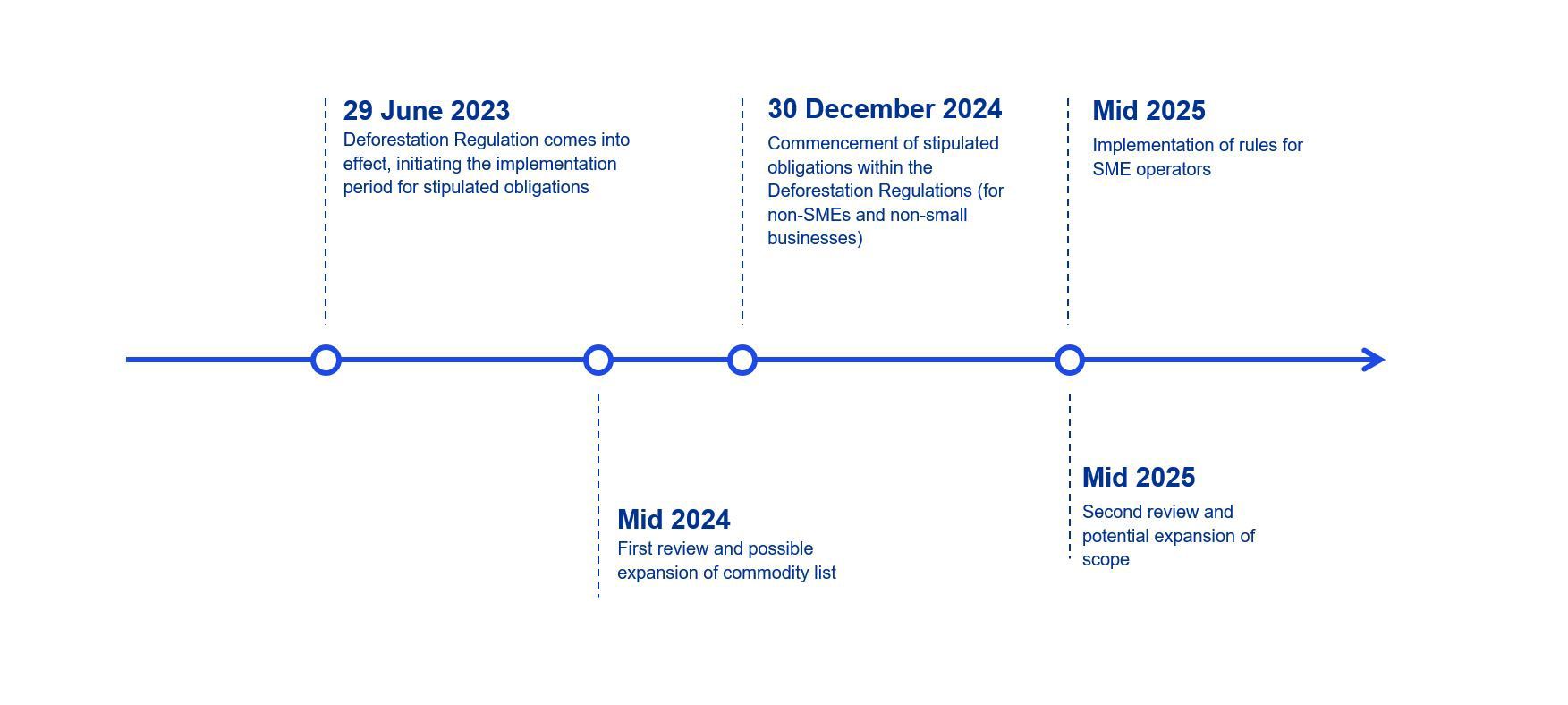EU Regulation on Deforestation-Free Supply Chains: what is it about?
The European Union Deforestation-free Regulation (EUDR) 1 is one key element of the global effort to curb the devastating human rights and environmental impacts of deforestation. As of 30 December 2024, the Regulation will establish strict due diligence requirements for companies involved in commercializing, manufacturing, and processing of seven commodities at high risk of deforestation (rubber, wood, cattle, soy, palm oil, cocoa, and coffee), and their derivatives.
Background
Over the past three decades, an area larger than the entire European Union has been deforested, highlighting the urgency of the issue.2 Agriculture and forestry activities are responsible for 23% of the anthropogenic greenhouse gas emissions between 2007 and 2016.3 Moreover, forests provide subsistence and income to approximately one third of the world’s population; the destruction of forests has serious consequences for the livelihoods of the most vulnerable people, including indigenous peoples.
The EUDR serves as a fundamental element of the EU Green Deal and an integral component of a comprehensive strategy for forest protection. Its overarching goal is to mitigate the devastating surge of deforestation and its ensuing impacts on human rights, particularly on indigenous peoples. Specifically, the EUDR aims to restrict the expansion of agricultural lands used for critical raw materials, starting with rubber, wood, cattle, soy, palm oil, cocoa, and coffee. The list of affected materials will be regularly updated to account for changing deforestation patterns.
The obligations outlined in this regulation must be implemented by December 2024, giving companies a short window of nine months to take action.

EUDR in detail
The regulation applies to market participants who import or export the relevant products in the EU market, as well as traders, manufacturers and processors of such products. The Regulation applies regardless of legal form or entity size. However, limited obligations and extended implementation timelines apply to SMEs and micro-enterprises.
The regulation prohibits the import, export and trade of cattle, cocoa, coffee, palm oil, rubber, soy, and wood and their derivatives (including, for instance, leather, beef, chocolate, rubber tires and selected industrial acids) within the EU unless they meet specific criteria:
- Deforestation-free since 2020, (i.e., produced on land that has not been subject to deforestation after the cut-off date of 31 December 2020).
- Produced in accordance with the relevant legislation of the country of production
- Availability of a due diligence statement
Implementation is achieved through the fulfillment of three steps:
- Information requirements
Companies must provide detailed information, including but not limited to: on raw materials, quantities, geolocation of cultivation areas, evidence of deforestation-free status and legality in the country of production. In practice, this entails providing verifiable proof that the commodities were produced respecting the applicable local legislation on topics such as land rights and indigenous peoples’ rights, labor and human rights, and environmental protection. - Risk assessment
Companies in scope must conduct a risk assessment to establish if there is a risk that the relevant products are non-complaint with the Regulation. The assessment should consider criteria such as country of origin, forest resources, deforestation prevalence, labor rights and human rights, presence of indigenous communities, the respect of the principle of Free, Prior and Informed Consent (FPIC) and more. The complexity of the supply chain, as well as factors such as local corruption, lack of law enforcement, and violations of international human rights, are also criteria to be taken into account in the assessment of risks. - Risk mitigation measures
Unless there is no, or only a negligible risk that the products are non-compliant, companies must develop adequate mitigation strategies and measures, controls and procedures. The mitigation approach should be annually documented and reviewed to ensure effectiveness and adaptability.
In addition, companies are subject to reporting requirements. Companies that are not classified as SMEs must publicly disclose their due diligence in this respect, including risk assessments and implemented measures.
Member states will ensure the enforcement of the EUDR, supported by an online system for information exchange and inspections.
Sanctions
The Regulation outlines clear sanctions for violations, including profit confiscation and fines of up to 4% of the annual turnover. Additionally, violations can result in temporary exclusion from public procurement processes, as well as confiscations and a temporary prohibition to place on the market or export the relevant commodities. While it remains uncertain whether the EUDR will be equipped with effective enforcement mechanisms, the sanctions defined by the Regulation are strict and may effectively result in an import ban for actors who fail to comply.
Challenges
The new regulations present various challenges for businesses:
- The EUDR poses a need for reliable data and traceability back to production location in a complex web of worldwide supply chains, requiring significant improvements in data availability and quality.
- The EUDR increases the need for effective technology solutions to support such transparency and traceability challenges.
- EUDR compliance requires close interaction with stakeholders along value chains, including smallholders. Furthermore, reviewing the supplier base and revising the supplier code of conduct are essential to adapt company policies to the impact of the new regulation.
- The EUDR is part of a complex ESG legislative landscape, posing challenges around process efficiency and avoiding duplication of efforts.
Our solution for you
KPMG's team specializing in Sustainable Supply Chain & Human Rights is here to help you tackle the challenges posed by the EUDR.
Our experts can assist in:
- Understanding:
Socializing and raising awareness among relevant stakeholders about EUDR’s core elements and potential impacts for your organization. - Assessing:
Identifying the gap between your organization’s current processes, technology, and data quality, and what is necessary to meet EUDR requirements. - Achieving:
Supporting you in selecting and deploying relevant IT tools to streamline data collection, analyses, and reporting processes.
1 Regulation (EU) 2023/1115 of the European Parliament and of the Council of 31 May 2023 on the making available on the Union market and the export from the Union of certain commodities and products associated with deforestation and forest degradation and repealing Regulation (EU) No 995/2010. See full text of the Regulation here

We will keep you informed by email.
Enter your preferences here.


